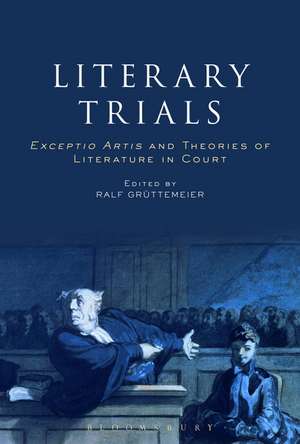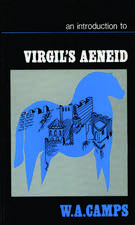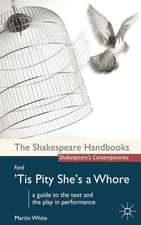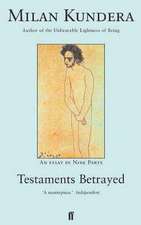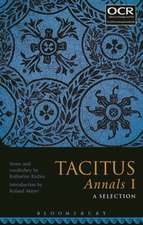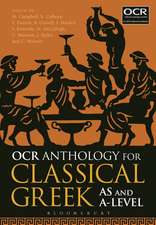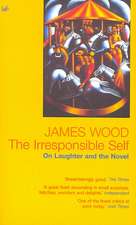Literary Trials: Exceptio Artis and Theories of Literature in Court
Autor Ralf Grüttemeieren Limba Engleză Hardback – 27 ian 2016
Preț: 710.65 lei
Preț vechi: 1027.78 lei
-31% Nou
Puncte Express: 1066
Preț estimativ în valută:
136.02€ • 141.76$ • 113.23£
136.02€ • 141.76$ • 113.23£
Carte tipărită la comandă
Livrare economică 07-21 ianuarie 25
Preluare comenzi: 021 569.72.76
Specificații
ISBN-13: 9781501303173
ISBN-10: 1501303171
Pagini: 240
Ilustrații: 2 b/w illustrations
Dimensiuni: 152 x 229 x 14 mm
Greutate: 0.49 kg
Editura: Bloomsbury Publishing
Colecția Bloomsbury Academic
Locul publicării:New York, United States
ISBN-10: 1501303171
Pagini: 240
Ilustrații: 2 b/w illustrations
Dimensiuni: 152 x 229 x 14 mm
Greutate: 0.49 kg
Editura: Bloomsbury Publishing
Colecția Bloomsbury Academic
Locul publicării:New York, United States
Caracteristici
Stimulates reflection on essential questions concerning literature: "What is fiction?" "Which interpretation counts and why?" "Should there be limitations to the freedom of literature?"
Notă biografică
Ralf Grüttemeier is Professor and Chair of Dutch Literature in the Faculty of Linguistics and Cultural Studies at Oldenburg University, Germany. He has formerly held the positions of Dean of Linguistics and Cultural Studies at Oldenburg University, Research Fellow of the Netherlands Institute of Advanced Study, and co-editor and editor-in-chief of the journal Internationale Neerlandistiek. He is co-editor of the journal Spiegel der Letteren.
Cuprins
AcknowledgmentsLiterary trials as mirrors. An introductionRalf Grüttemeier (Oldenburg University, Germany)I. Towards more autonomy of literature. Histories of literary trials1. The Legal Responsibility of the Writer between Objectivity and Subjectivity: The French Case (19th-21st Century)Gisèle Sapiro (CNRS (Centre de sociologie européenne-Paris), France)2. The Making of the 1959 Obscene Publications Act: Trials and Debates on Literary Obscenity in Britain Before the Case of Lady ChatterleyAnton Kirchhofer (Oldenburg University, Germany)3. Law and the Literary Field in South Africa, 1910-2010Ted Laros (Oldenburg University, Germany)4. De Sade as a Benchmark. Dutch Legal Actions Against Obscenity in Literature, Theatre and Film in the 1960s and 70sKlaus Beekman (Universiteit van Amsterdam, The Netherlands)5. Freedom of Satire? Oscar Panizza's Play Das Liebeskonzil in a Series of Trials in Germany and AustriaClaudia Lieb (University of Münster, Germany)6. 'Words Are No Deeds': Trials Against Literature in the Soviet UnionSylvia Sasse (University of Zürich, Switzerland)II. Change of Rules? The Challenges of Defamation and Religion7. Literature Losing Legal Ground in Germany? The Case of Maxim Biller's Esra (2003-2009)Ralf Grüttemeier (Oldenburg University, Germany)8. Defamation Trials in Belgium: The Case of Herman Brusselmans' Uitgeverij GuggenheimerKatharina Hupe (Oldenburg University, Germany)9. Libellous Literature: Elton John and the Perils of Close ReadingPeter D. McDonald (University of Oxford, UK)10. 'The law is a ass': Obscenity, Blasphemy and Other Literary Offences After Lady ChatterleyMartin A. Kayman (Cardiff University, UK)Notes on ContributorsIndex
Recenzii
This edited collection is remarkably cohesive, whilst at the same time it covers an impressive scope.
This highly informative book shows how, in different countries with different laws, concepts of literature of one kind or another have been an integral element in legal arguments and court decisions regarding the banning of works, and the censure of a work's author. Emphasizing the complex role played by concepts or theories of literature in particular cases, Literary Trials is impressive in its comparative scope. What makes it essential reading is how it updates existing scholarship on literary trials by analyzing how recent cases have moved to different legal ground such as defamation, and have brought into question well established ideas about literature, such as exceptio artis.
Literary Trials attests to the complexity of interactions between legal tribunals and literature. The volume demonstrates how legal actors rely on by no means unchanging literary theories to deliberate on whether literature should be legally contained or left alone, when it is determined to belong to a specialized aesthetic realm standing apart from the judicable. With essays on developments in Germany, the Netherlands, France, Britain, and Belgium, and elsewhere, Literary Trials serves to move the project of articulating European Law and Literature as well as comparative research forward by demonstrating the specificity of individual legal-institutional and literary histories as well as by addressing supranational developments.
This highly informative book shows how, in different countries with different laws, concepts of literature of one kind or another have been an integral element in legal arguments and court decisions regarding the banning of works, and the censure of a work's author. Emphasizing the complex role played by concepts or theories of literature in particular cases, Literary Trials is impressive in its comparative scope. What makes it essential reading is how it updates existing scholarship on literary trials by analyzing how recent cases have moved to different legal ground such as defamation, and have brought into question well established ideas about literature, such as exceptio artis.
Literary Trials attests to the complexity of interactions between legal tribunals and literature. The volume demonstrates how legal actors rely on by no means unchanging literary theories to deliberate on whether literature should be legally contained or left alone, when it is determined to belong to a specialized aesthetic realm standing apart from the judicable. With essays on developments in Germany, the Netherlands, France, Britain, and Belgium, and elsewhere, Literary Trials serves to move the project of articulating European Law and Literature as well as comparative research forward by demonstrating the specificity of individual legal-institutional and literary histories as well as by addressing supranational developments.
